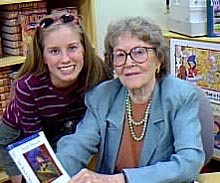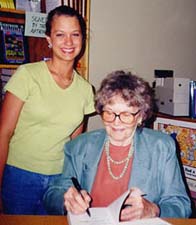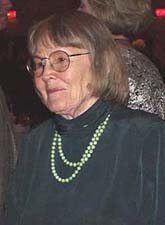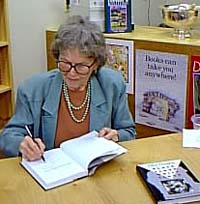Major Works
- Witnessing (2004) University Press of Mississippi)
- Truth: Four Stories I Am Finally Old Enough to Tell (1998)
- Where The Dreams Cross (1968)
- A Family’s Affairs
- Black Cloud, White Cloud: Two Novellas and Two Stories
- Where the Dreams Cross
- Apostles of Light
- The Rock Cried Out
- A Lifetime Burning
- Can’t Quit You, Baby
- The Magic Carpet and Other Tales (Walter Anderson–illustrator)
- A Long Night
Biography of Ellen Douglas (Josephine Ayres Haxton)
by Julie Tomlinson, SHS
Ellen Douglas is the pen name of Josephine Ayres Haxton. She chose to write under the pseudonym of Ellen Douglas because, as she stated in a 1998 essay, her first novel was “based very closely on the lives of my two aunts, very private ladies who would take a dim view of having that privacy violated in a book that anybody might buy and read.” She is recognized as a prominent contemporary author in Mississippi. Her many works of literature usually follow this particular pattern: re-imagining the child, and then the emerging adult. Because Douglas’s fictional writing is universal, people of all races can relate to it. Her literary success has been achieved through a life of hard work and dedication. Many of her works are set in the fictional town of Homochitto, Mississippi.
Ellen Douglas, (real name Josephine Haxton), was born on July 12, 1921, in Natchez, Mississippi. When she graduated from the University of Mississippi in 1942, she married R. Kenneth Haxton, Jr., a Mississippi composer and author. They had three children, whose names are Richard, Brooks, and Ayres (her maiden name), but they are now divorced. Their son, Brooks Haxton, is a poet.
Douglas’s fiction is anchored by time and place. She states, “Place is the means by which you enter a story. I need the familiarity of my own surroundings to hear the voice.” Ellen Douglas cherishes the gifts of nature in the state of Mississippi. In her eyes, not only is Mississippi a gift, but it gives her novels a place to call home.
During her life, Ellen Douglas has won many awards and honors. “On the Lake,” one of Douglas’s short stories, was included in the O. Henry collection in 1961. Her novel A Family’s Affairs was awarded the Houghton Mifflin fellowship in that same year and also was recognized as one of the five best novels of the year by the New York Times. Douglas’s novel Black Cloud, White Cloud was named one of the five best works of fiction by the New York Times in 1963. In 1973 Apostles of Light, another novel, was nominated for the National Book Award by the National Book Committee. Douglas was also awarded a National Endowment for the Humanities fellowship in 1976 and the Mississippi Institute of Arts and Letters Award for literature in 1979 and 1983. Ellen Douglas is an elected member under the University of Tennessee Chattanooga Lupton Library’s Fellowship of Southern Writers and is recognized as the first recipient of the Hillsdale Prize for Fiction.
During her career she has held many important positions. From 1976-1979 Douglas was writer-in-residence at Northeast Louisiana University in Monroe. She was a writer-in-residence at the University of Mississippi in Oxford from 1979 until 1983. While at Ole Miss, Larry Brown, another Mississippi writer, took her class. She taught at the University of Virginia in Charlottesville during the spring of 1984. She was a faculty member of the Faulkner Symposium at the University of Mississippi in 1980. In 9996 Douglas was living in Jackson, Mississippi ,and is working on writing short stories. She was married for a time to Kenneth Haxton of Greenville. Her son Brooks Haxton is a poet.
Ellen Douglas’s commitment to perfection in the literary world has been rewarding. Not only has her writing entertained readers, but it has also benefitted the state of Mississippi. In conclusion, Douglas’s works of literature are enjoyed by readers because of her pleasurable style of writing as she presents a portrait of Mississippi and its people.
Ellen Douglas died Nov. 7, 2012, at the age of 91. At the time of her death, she was living in Jackson, Mississippi.
Reviews
A Review of Can’t Quit You Baby (1996)
by Julie Tomlinson (SHS)
The novel Can’t Quit You, Baby by Ellen Douglas is filled with compassion and heartache, but it is based on a friendship that stands on solid ground. The main characters in the novel experience hardships, but in the end they find consolation in one another and the importance of a strong friendship.
As the two main characters, Cornelia and Julia, struggle through life’s hardships, they discover that overcoming obstacles is difficult, but not impossible. Personality changes occur in both characters as their lives progress and obstacles present themselves. Cornelia O’Kelly, a white woman who sits high and proud, leads a life of continuous perfection. She is a forty-four year old woman with chestnut-colored hair living a sheltered life. She hides behind the shadows of loved ones and the hearing aid that she often turns off as she pretends to hear. Julia, on the other hand, is a black woman who works for Cornelia, and who possesses “eyes with shrewdness that bring out a passionate lover and an outraged woman.” Her nickname, Tweet, was given to her by her grandfather, whom she admired greatly. These two women, although they are of different races and have different pasts, are close friends at heart. Tweet and Cornelia experience times of discouragement, suffering both with the inner self and life in general. In the end they realize that their friendship has been the basic building block in recovering from difficult times.
This novel plants its roots in the setting, which is Mississippi during the 1960’s and 1970’s, and these roots expand as the plot develops. The novel begins in Cornelia’s kitchen as Tweet performs her daily routine of telling stories of her past. She speaks of her grandfather and the struggle she experienced with his death. Tweet was fifteen when this tragedy occurred, and she immediately married a man called “Nig,” a hard worker almost twenty years older than she. The narrator, on the other hand, tells about Cornelia’s past because Cornelia speaks little about her personal life. Cornelia’s mother was never loving or affectionate toward Cornelia. The narrator explains the difficult time that Cornelia experienced when she planned to be married to John O’Kelly, a man in the military. Her mother was against their marriage plans from the beginning and did everything possible to change Cornelia’s mind. She even locked Cornelia in her room. Cornelia and John finally manage to elope. The flashback ends and the setting then changes to present day. The narrator tells the stories of Tweet and Cornelia in their present lives. Cornelia and John are still happily married with two children, Andrew and Sarah. John suffers a sudden stroke and dies. Cornelia does not know how to deal with John’s death. She experiences a difficult time as she grieves for her husband. She decides to take a short trip to New York to gather her thoughts. One night she receives a phone call from Tweet’s stepdaughter explaining that Tweet is sick. Cornelia recollects her personal thoughts and returns home the following day. She goes to visit Tweet each day, but Tweet’s mind is distant, and she cannot speak or walk. Finally, Tweet recovers with the help of Cornelia. It is then that they realize the importance of their friendship.
The novel is written primarily in third person omniscient point of view, but Tweet’s stories are told in the first person. Occasionally, the author even addresses the reader in the second person, so Douglas’s style is rather unique. Ellen Douglas sets a mood that is compassionate and sympathetic. The plot is uplifting because no matter how bad things get, the characters manage to overcome their problems.. Douglas wrote this novel to entertain, but also to express her personal feelings about friendship between women of different backgrounds and races. The setting in Mississippi is important because Douglas believes that time and place are the novel’s basis in her style of writing. She also explicitly describes characters and their backgrounds.
The title of this novel is very significant. There are two sections in the novel when Tweet says “Well, I can’t quit you, baby. Just now and then put you down awhile. Love you, baby, but I sure do hate your ways. I say, I love you, darlin, but I hate your treacherous lowdown ways.” I believe that Douglas means that no matter how bad times get or how mad you are at a loved one, a person can’t give up on life or a loved one. The person just “puts” the loved one or the problem down for awhile.
This novel’s theme is unquestionably important as Cornelia and Tweet grow in their friendship. The theme is about life’s hardships and difficulties and how friends can help . I believe that Douglas is trying to state that whatever conflict a person faces, a strong friendship will stand.
In conclusion, I enjoyed this novel very much because of the way it relates to all people. Ellen Douglas now stands out in my mind ,not only as a Mississippi writer, but also a famous American writer. Her appreciation for Mississippi, which is highlighted in her writing, makes me feel proud to be a part of this state.
Book Review of The Rock Cried Out
by Leigh Johnson (SHS)
The novel The Rock Cried Out by Ellen Douglas is focused on the past and the search for the truth. It revolves around secret love, racism, tragedy, and revenge. Like William Faulkner, Ellen Douglas has created a fictional Mississippi county, called Homochito County. Many of her novels take place in this county, one of them being The Rock Cried Out. This novel takes place in the early 1970s, but has flashbacks to the early 1960s. Douglas is very descriptive about the setting and atmosphere. She helps the reader imagine the sights, sounds, and smells of the back woods in Chickasaw Ridge.
The novel starts off slowly, but gets better toward the middle. In the beginning of the novel she describes the setting in detail. I enjoy reading books that have a very descriptive setting. Douglas also does a very good job of describing the characters, such as Alan, Miriam, Sam, and Leila. The narrator, Alan McLaurin, is an ex-hippie who returns to his home of Chickasaw Ridge in 1971. He is an aspiring poet who left Boston to return to the peace and quiet of Chickasaw Ridge. He finds the small town still haunted by memories of 1964, when the civil rights movement was at its height. The same year a local black church was destroyed by arsonists and there was a mysterious car crash, which killed Alan’s cousin and his black friend’s (Sam Daniels) wife. As the story unwinds, Alan finds out the truth about these mysteries.
When Alan returns to his cabin in the woods of Chickasaw Ridge he reunites with his black friend, Sam Daniels. Sam lives on the land and is a close friend of Alan’s family. Sam has just gotten out of Parchman (a Mississippi penal institution) for destroying government property and trying to kill two men. Alan’s uncle, Lester, and Sam do not get along. Lester’s daughter had been killed in the mysterious car crash that also killed Sam’s wife. Sam was driving the car when the accident occurred. Lester blamed Sam for the death of his daughter and has held a grudge against him ever since. As a result, Lester sold some of the land Sam was using to the government so that they could build on it. This action made Sam go crazy. He got drunk and herded his cattle through the government property, which resulted in his being sent to jail.
After Alan has fixed up the cabin, he asks his girlfriend, Miriam, to come and visit. His aunt, Leila, also comes down. Alan finds out one night when Leila is drunk that she and Sam had an affair before he went to jail (Remember that Sam is black and Leila is white). There is still an attraction between Leila and Sam throughout the story. Miriam and Alan run into one of Alan’s old friends (Lee) one day at the local store. They become good friends again and end up spending a lot of time together. Miriam and Lee become really close and end up having an affair.
Because of the sexual language and profanity, I was not able to finish the story. The story revolves around secret love and the past. The book begins somewhat slowly and gets better toward the middle. I have read some of Douglas’s other stories and was surprised at how different this novel was. I wish that I could have finished it, but it was just too racy. However, I would recommend this book to someone a little older. Since I could not finish the book, I did not find out how the mysteries were finally pieced together.
Review of Witnessing
Ellen Douglas has written both fiction and non-fiction. Her book Witnessing is a collection of entertaining and thought-provoking essays written over a period of forty years . They reveal her observations about events over the years which are personal and/or historical. She states in her preface that some of the essays in this book were written for certain occasions and were published in quarterlies or anthologies, but some are written just for this book. The sixteen essays are thematically grouped in four categories: Time and Place, On Writers, On Writing, and Witnessing. Josephine Humphreys in her review of Witnessing calls the book a “treasure.” She says, “To read it is to look inside the mind and heart of a writer of enormous insight, wit, and integrity, one whose love and understanding of the complicated South is unsurpassed in our time.” Douglas is the recipient of the 2000 American Academy of Arts and Letters Award in Literature
Telephone Interview with Ellen Douglas (Josephine Haxton)
by Julie Tomlinson (December 1996)
1. Why did you choose a pen name?
“My first book, A Family’s Affair, was closely based on my two aunts. They did not want me to use my real name.”
2. Are you working on any new works of literature presently?
“Yes, I am working on some short stories. One of them is presently in The Southern Review.”
3. How long did it take you to write Can’t Quit You, Baby?
“It took me about three and a half to four years. I didn’t write constantly, but off and on.”
4. Was there any certain thing that possessed you to write this novel?
“I started out thinking that I would write short stories based on Tweet’s stories of her past. I then started thinking about who Tweet was going to tell the stories to. That is how I thought of Cornelia’s character.”
5. What theme were you trying to get across to the readers?
“There are so many things that come to my mind. I would rather the reader just think about what he/she gets out of it.”
Related Websites and Bibliography
- New York Times obituary for Ellen Douglas by Margalit Fox on Nov. 12, 2012
- Telephone interview with EllenDouglas by Julie Tomlinson (see above) 1996
- Biography of Ellen Douglas on Ole Miss Writers Site.
- Read about Conversations with Ellen Douglas, which is edited by Panthea Reid.. It’s a collection of interviews from “three decades features one of the South’s most prominent contemporary writers, one of America’s most dazzling practitioners of postmodern fiction.”
- Review of Truth: Four Stories I Am Finally Old Enough to Tell on Amazon site.
- Lemuria Books lists various editions of Douglas’s book.
- Panthea Reid discusses Four Stories I Am Finally Old Enough to Tell.




